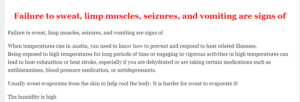Failure to sweat, limp muscles, seizures, and vomiting are signs of
Failure to sweat, limp muscles, seizures, and vomiting are signs of
Failure to sweat, limp muscles, seizures, and vomiting are signs of 
When temperatures rise in Austin, you need to know how to prevent and respond to heat related illnesses.
Being exposed to high temperatures for long periods of time or engaging in vigorous activities in high temperatures can lead to heat exhaustion or heat stroke, especially if you are dehydrated or are taking certain medications such as antihistamines, blood pressure medication, or antidepressants.
Usually sweat evaporates from the skin to help cool the body. It is harder for sweat to evaporate if:
The humidity is high
You are wearing tight or layered clothing that covers most of your skin
You are dehydrated, which will cause you to produce less sweat
Heat Exhaustion
Heat exhaustion is a less serious condition than heat stroke. Symptoms can include:
Normal or only slightly elevated body temperature
Cool, moist (clammy), pale skin
Sweating (sometimes heavily)
Headache
Nausea/vomiting
Dizziness/weakness/fatigue
Rapid pulse
Decreased blood pressure
Dark urine
Muscle cramps
Rapid/shallow breathing
Use the following coupon code :
premiernursingpapers


